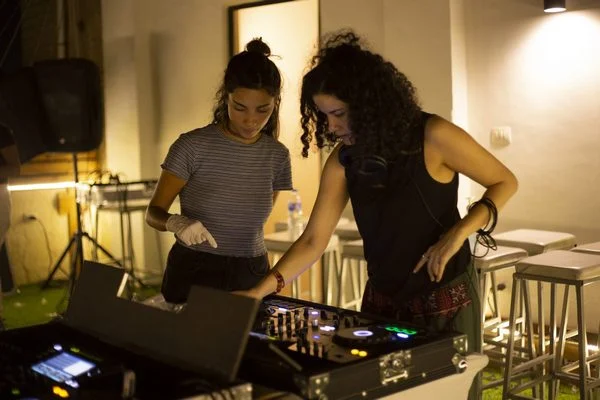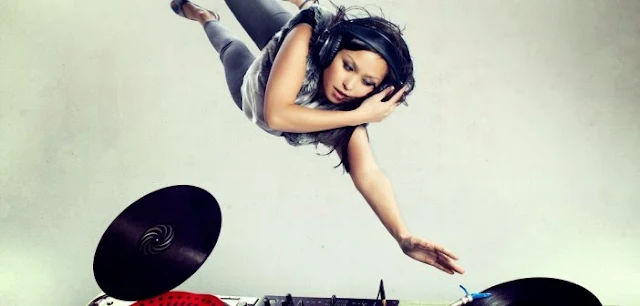Understanding the DJ Role
A DJ’s primary role is to curate, mix, and transition between tracks to engage and entertain their audience. Mastering techniques like beat-matching, phrasing, scratching, and EQing can contribute to a smooth and engaging flow of music. Skilled DJs are also experts at reading a room, adjusting their set in real-time based on audience reactions to keep the energy high. This requires not only technical skills but also a deep understanding of music theory, rhythm, and genre diversity.
Training and Skills Needed to Become a DJ
1. Mastering Equipment and Software
DJs rely on a combination of equipment, including turntables, CDJs, controllers, and software like Serato, Traktor, or Rekordbox. Learning to use both hardware and software is key to creating professional, seamless mixes. Some DJs prefer the tactile experience of vinyl records, while others work with digital libraries, offering flexibility and access to a larger range of music.
- Practice regularly with your gear to develop familiarity with each component and its role in mixing.
- Explore DJ software to understand digital mixing, beat-matching, effects, and other tools available to enhance sets.
- Consider vinyl DJing if you are interested in the classic turntable experience and want to learn skills like scratching and analog mixing.
2. Core DJ Techniques
Certain foundational skills are essential for creating smooth, professional transitions:
- Beat-matching: Synchronizing the beats of two tracks to allow for fluid transitions.
- Phrasing and timing: Knowing when to switch tracks based on musical phrases, beats, and audience engagement.
- Scratching: For turntable DJs, scratching adds a rhythmic layer, using the turntable as an instrument to create unique sounds.
- EQing: Adjusting the bass, mids, and treble to create harmonious blends, particularly during transitions.
3. Building a Music Collection
A DJ’s music library is an essential part of their identity and requires consistent updating and curation. The best DJs have a deep collection that allows them to be versatile, adapting to different events, moods, and crowd types.
- Stay updated on new music and releases by following trends in different genres.
- Explore a variety of genres to develop versatility and adapt to diverse audiences.
- Organize your collection for easy access, helping you find tracks quickly during live performances.
4. Practicing for Live Performance
Refining your skills through live practice is essential. Start by practicing at home, recording your sets, and analyzing what worked and what could be improved. Once you’re comfortable, seek out live gigs, even small ones like house parties or community events, as they provide real feedback and help improve crowd-reading abilities. Consistent live experience is key to developing confidence and mastering your DJ style.
Is Formal Education Required?
Formal education is not required to become a DJ. Many successful DJs are self-taught, relying on online resources like tutorials, forums, and video lessons to develop their skills. However, there are also music production schools and DJ courses available, which can provide hands-on training, structured learning, and exposure to industry professionals. Regardless of the learning path, dedication to practice and continuous improvement is crucial.
Building a Career as a DJ
Income and Career Progression
The earnings of a DJ can vary widely. High-profile DJs may earn thousands per performance, while those just starting out may earn between $100 and $500 per gig at clubs or events. Wedding DJs, on the other hand, typically charge more due to the additional responsibilities and costs involved.
To grow a career, DJs must work to build a strong personal brand and fanbase:
- Social Media and Promotion: Share your mixes online, build a presence on platforms like Instagram, SoundCloud, and Mixcloud, and engage with fans.
- Networking: Develop relationships with club owners, event promoters, and other DJs. Building a network opens doors to more opportunities and helps increase visibility.
- Growing a Following: A solid fanbase attracts higher-paying gigs and provides more opportunities to perform at larger venues. Consistent performances and engagement with the music community are essential for building a loyal audience.
Exploring New Horizons
With experience, DJs can branch out into related fields. Many go on to host their own events, collaborate with other musicians, or even produce original music. Others expand into areas like remixing, event promotion, or teaching, giving them new ways to express their skills and creativity.
Job Prospects and Long-Term Potential
Due to the accessibility of technology, more people than ever are pursuing DJing, which has increased competition. For most, DJing starts as a part-time venture, with steady, full-time opportunities arising only after years of building a strong reputation. As DJs gain experience, they can command higher fees, attract more prestigious gigs, and create additional opportunities through partnerships and collaborations. Some DJs eventually transition into music production or manage their own events and brands.
How to Get Started: Tips for New DJs
- Start Small: Gain experience by DJing at small events, house parties, or local community gatherings.
- Practice Consistently: Treat it like learning any other instrument—dedicate time to honing your craft.
- Observe Other DJs: Attend local shows, study different DJs’ techniques, and analyze their mixing styles.
- Share Your Mixes Online: Platforms like SoundCloud, Mixcloud, and YouTube are perfect for sharing your mixes with potential fans and promoters.
- Stay Informed: Follow DJ blogs, forums, and websites like DJ TechTools, Digital DJ Tips, and MusicRadar for the latest trends, gear reviews, and tutorials.
Final Thoughts
Becoming a professional DJ is a journey of creativity, skill, and persistence. It requires not only musical talent but also the ability to adapt, engage with an audience, and promote yourself effectively. With practice, dedication, and passion, you can build a rewarding career and become a DJ who doesn’t just play music, but creates unforgettable experiences for your audience.



